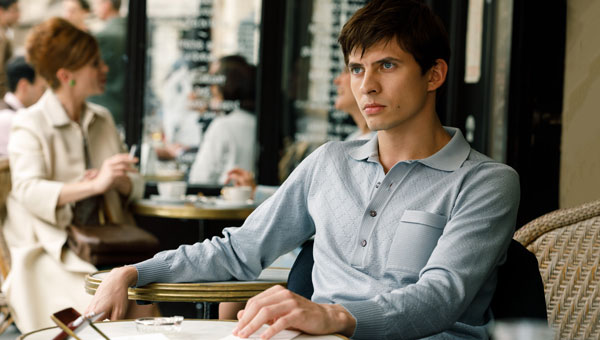The White Crow Review

Directed by and featuring Ralph Fiennes, The White Crow is the story of the formative years of Rudolf Nureyev, and his journey from birth on The Trans-Siberian Express, via his childhood as an emerging ballet prodigy, leading up to eventual defection to the West.
The story jerks back and forth disconcertingly, taking in his teenage years as the protégé of Fiennes’ paternal instructor Alexander Pushkin. He takes the temperamental Nuyerev under his wing, inviting him to live in his home whilst he recuperates from injury. Pushkin’s wife Xenia takes a more prosaic interest in the charismatic young man.
But the centre of this story is his time spent in Paris with the touring Mariinsky Ballet and the build up to his defection. Here we see the real Nureyev, played by Oleg Ivenko, begin to emerge. He is brilliant; rebellious, engaging but maddeningly headstrong and often boorish.
He gorges on Paris with the appetite of the wide-eyed tourist, displaying none of the zealous discipline required of the principal dancer. This is much to the frustration of his masters and ultimately the backdrop forming KGB, who are engaged by the Soviet government to protect any of their charges from the perils of the West.
But our hero will not be contained, he makes friends with ballet dancers from the West against the wishes of his supervisors. He ostentatiously flirts with Parisian socialites at official functions, attends parties, breaks curfews and screws around.
But as long as he is performing to the standard, the company’s stern management tolerate him; aware that just as Nureyev is utterly enchanted by Paris, the city adores him back. On the cusp of superstardom, Nureyev finds himself caught in the eye of the storm, like the modern-day boy band member rendered captive in the prison of his own notoriety.
Something has to give. Eventually his continued rebelliousness sees him ordered to return to Moscow as the rest of the company extend their enormously successful tour to London.
He is devastated, his overseas adventure at an end, painfully aware that he is being sent home to face the consequences of his behaviour, whatever that might mean.
The suspense then builds to the film’s dénouement. Scenes where a frantic Rudolph takes advice from Clara Saint, a besotted, bored but resourceful trust fund heiress, to approach the French authorities and request asylum at Paris Airport whilst Soviet agents watch on, are superbly executed. The tension builds as if watching the most paranoid of cold war dramas. The airport ticket hall soon to be Nureyev’s personal Checkpoint Charlie.
And therein lies the fascination of Nureyev’s extraordinary life. Not only an icon of the era but a political refugee and precious pawn caught between two superpowers engaged in a nuclear standoff.
David Hare’s screenplay does do this justice but the jumping back and forth between chapters of life doesn’t sit well, especially when the material and story is strong enough to stand on its own.
Fiennes makes the most of Ivenko’s professional dance background in shooting prolonged and captivating scenes of dance within the panelled walls of rehearsal studios, the authenticity of these sequences adding to the narrative. Dance aside, the lead’s performance is powerful and unapologetic, Nuryev’s occasional spite and infuriating, maddening brilliance brought to life.
The support is also strong, Fiennes is interesting and understated as Pushkin; never really giving the impression that training a talent of such magnitude is in any way enjoyable, but rather a heavy load of responsibility, fraught with agonising stress and anxiety.
Made with love and very nice to look at, The White Crow is an occasionally frustrating, engaging and at times gripping film about a prodigiously gifted young man coming to terms with his success and the rapidly changing world around him.
Frank Gardiner